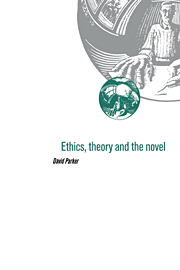Book contents
- Frontmatter
- Contents
- Acknowledgements
- Part I THE ETHICAL UNCONSCIOUS
- Part II SOCIAL BEINGS AND INNOCENTS
- Chapter 6 ‘Bound in Charity’: Middlemarch
- Chapter 7 Forgetting and disorientation in Anna Karenina
- Chapter 8 Two ideas of innocence in The white peacock
- Chapter 9 Into the ideological unknown: Women in love
- Chapter 10 Lawrence and Lady Chatterley: the teller and the tale
- Part III TOWARDS A NEW EVALUATIVE DISCOURSE
- Notes
- Bibliography
- Index
Chapter 7 - Forgetting and disorientation in Anna Karenina
Published online by Cambridge University Press: 05 November 2011
- Frontmatter
- Contents
- Acknowledgements
- Part I THE ETHICAL UNCONSCIOUS
- Part II SOCIAL BEINGS AND INNOCENTS
- Chapter 6 ‘Bound in Charity’: Middlemarch
- Chapter 7 Forgetting and disorientation in Anna Karenina
- Chapter 8 Two ideas of innocence in The white peacock
- Chapter 9 Into the ideological unknown: Women in love
- Chapter 10 Lawrence and Lady Chatterley: the teller and the tale
- Part III TOWARDS A NEW EVALUATIVE DISCOURSE
- Notes
- Bibliography
- Index
Summary
As Jane Adamson has pointed out, it is George Eliot's characteristic bent to remember that all her characters are ‘equivalent centres of self’ but sometimes to forget the extent to which ‘the lights and shadows must always fall with a certain difference’. Middlemarch is a very great novel partly because it keeps reminding us of human connectedness, interdependence, and the commonness of our lot; but its greatness is uneven because at crucial moments the novel loses sight of the importance of individual need and desire. In its commitment to a master-narrative of moral sympathy and impartiality, Middlemarch has no terms in which it can grant ethical legitimacy to those non-sympathetic feelings which individuals need in order to defend themselves. The lack of such a language, as I have argued, ultimately eviscerates morality, at moments even twisting its generous ideals into their opposites. Without an adequate ethical vocabulary of need and desire, the novel itself, as Lawrence would say, will be pulling down the scale to its own predilection and so preventing that ‘trembling instability of the balance’ which is the ultimate ‘morality’ of novelistic discourse.
We find such an adequate language in Tolstoy's notion of the ‘heart’. In Anna Karenina, the ‘heart’ is partly a source of feeling, but one which includes both those ‘classical’ moral feelings that are the virtuous traces of reflection and choice as well as those gnawings of expressive desire and need that are so often suppressed by reflection and choice.
- Type
- Chapter
- Information
- Ethics, Theory and the Novel , pp. 107 - 125Publisher: Cambridge University PressPrint publication year: 1994



